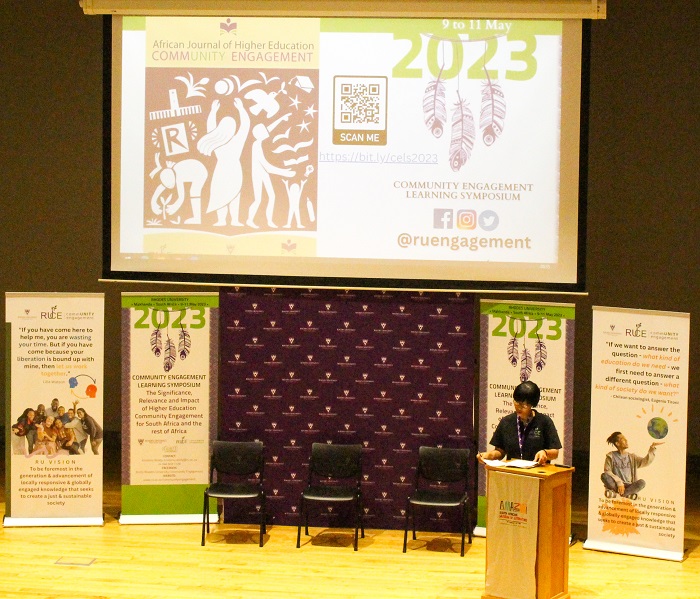By ‘Odidi Matai-Sigudla and RU Communication and Advancement
It was an educational week for those who attended the 2023 Community Engagement Learning Symposium hosted by Rhodes University Community Engagement (RUCE) at Amazwi Museum, from 9-11 May. The symposium highlighted higher education community engagement and its relevance and impact on South Africa and was filled with many experts who had boundless amounts of knowledge to share with those willing to feast.
It included Professor George Openjuru, the Vice-Chancellor of Gulu University in Uganda; Martina Jordaan, Head of Community Engagement Research and Postgraduate Students at the University of Pretoria; Hannes Engelbrecht, Historical and Heritage Studies lecturer from the University of Pretoria, Bruce Damons, Director of the Centre for the Community School at Nelson Mandela University; and Professor Vhonani Olive Netshandama, Director of Community Engagement in the University of Venda.
Photo: Rhodes University.
Topics looking at the effectiveness of monitoring and evaluation on community engagement within historically disadvantaged universities in South Africa, and highlighting transformative community-university partnerships were discussed.
Prof Openjuru stated that universities’ strong relationship with communities and their commitment to community engagement was imperative. He said, “Many universities in a number of African countries were established as a response to community needs and to contribute to solving some well-defined community problems.”
Openjuru added that Community-University Engagement is not new in Africa. As an example, he said that community engagement started at Makerere University in 1953. Since then, such engagements have entered into and continue to exist in many African universities. The concept of Community University Engagement emphasises the importance of universities working together with their surrounding communities to address local challenges.
These partnerships between communities and universities provide research opportunities that address pressing social issues. They facilitate the co-creation of knowledge, which is mutually beneficial, he said.
“Community engagement describes the collaboration between institutions of higher education and their larger communities, for the mutually beneficial exchange of knowledge and resources in a context of partnership and reciprocity,” explained Dr. Marisol Morales, Executive Director of the Carnegie Elective Classifications at the American Council on Education.
“What seems to be lacking in South Africa at least, something which was there during Apartheid, is the will to the people,” one of the participants said. “Hence we have all sorts of things happening, for instance, corruption. We think of the community as them there. If you stand at the Monument and then you look across Makhanda, the contrast is visible even to a blind person,” the participant added.
Morales answered by pointing to the youth. “Each campus would answer this differently because (in terms of community colleges) many of their students come from the local community, many of their activities are happening on campus, so there’s not this sort of separation between the campus and the community.”
“But I think that what part of what this work does inspire us to do is to think about what are the rules of engagement,” Morales continues. “Like, if we put students in these positions and they’re seeing the impact of the policies, they’re seeing it impacted on the communities that they’re a part of and that they’re working with, hopefully, those will be the motivations that keep them committed to the ethics of community and the ethics of responsibility,” she added.
(Nwabisa Moyo from RU Communication and Advancement contributed to this story).


